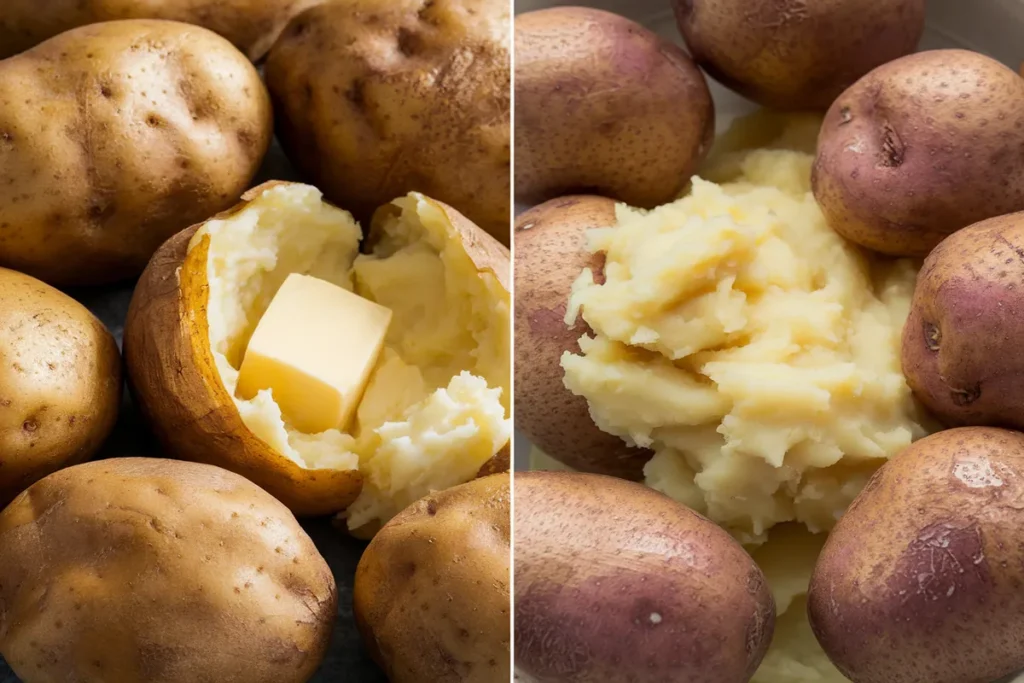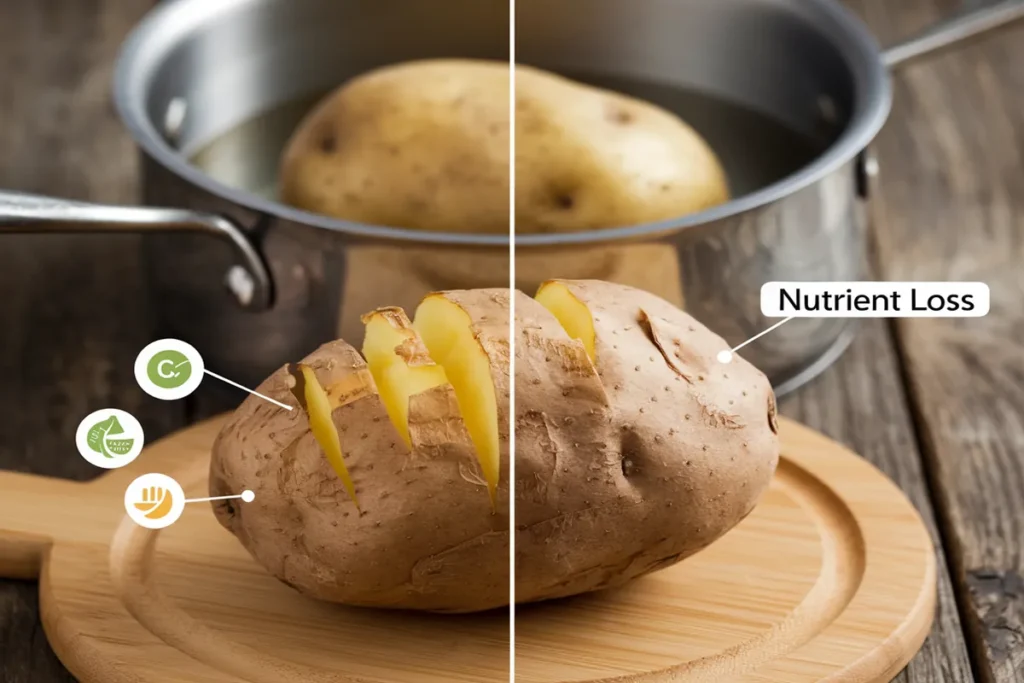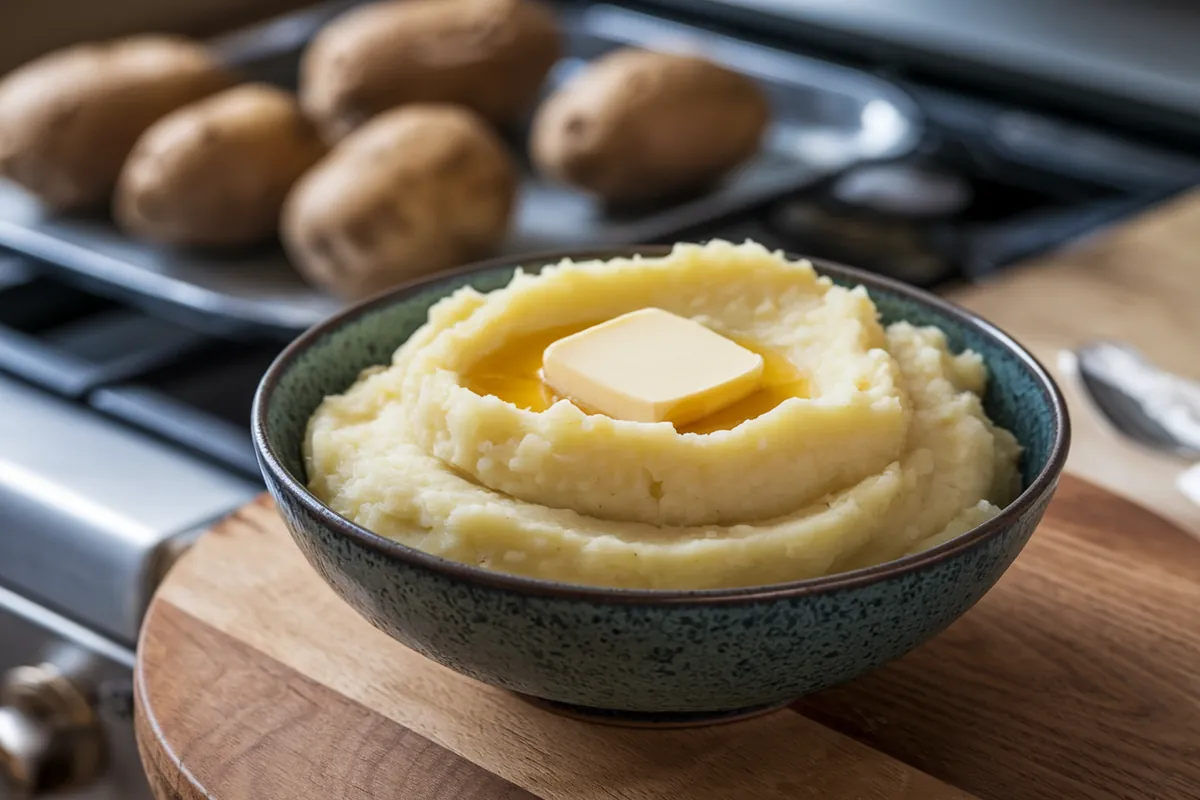When it comes to preparing mashed potatoes, there are several methods you can use to cook your potatoes, but each method impacts the final product in unique ways. While boiling is the traditional approach, baking potatoes is gaining popularity for its ability to bring out deeper flavors and create a fluffier texture.
The big question many home cooks ask is: Is it better to bake potatoes for mashed potatoes? In this article, we’ll explore both cooking methods, weigh the pros and cons, dive into the science behind texture, and discuss how you can create the ultimate mashed potatoes by baking them.
Why Potatoes Matter in Mashed Potatoes
The potato is the star of the show when it comes to making mashed potatoes. Selecting the right variety of potato is essential to achieving the perfect texture and flavor. Russet potatoes and Yukon Gold potatoes are the most common types used for mashed potatoes due to their high starch content.
Potato Varieties Best for Mashed Potatoes
- Russet Potatoes: High in starch and low in moisture, these potatoes create fluffy mashed potatoes that are easy to mash and absorb butter and cream well.
- Yukon Gold Potatoes: Known for their buttery texture, Yukon Golds offer a rich flavor with a creamier consistency compared to Russets.
- Red Potatoes: These waxy potatoes contain less starch and are best for boiled or roasted dishes. While they can be used for mashed potatoes, they often result in a denser, chunkier consistency.
Choosing the Right Potatoes for Baking
When you’re planning to bake potatoes for mashed potatoes, Russets and Yukon Golds remain the top choices. Their natural starch content ensures a light and fluffy texture when baked, making them ideal for mashing. Baked potatoes tend to hold up better under mashing, allowing you to avoid the gluey texture that sometimes comes from boiling.
Boiling vs Baking Potatoes for Mashed Potatoes
Now let’s compare boiling and baking and why you might choose one over the other depending on your goals for your mashed potatoes.
Boiling Potatoes
Boiling is the traditional method most people are familiar with. It’s a quicker process and more convenient for weeknight dinners. You simply peel the potatoes, chop them into pieces, and boil them in salted water. Once they’re fork-tender, they’re ready to mash.
- Pros:
- Faster cooking time.
- Easier to control the doneness.
- Can be done while you prepare other parts of your meal.
- Cons:
- Potatoes absorb water, which can dilute their flavor.
- Overcooking can result in watery or gluey mashed potatoes.
- Boiling leaches out some nutrients, particularly water-soluble vitamins like Vitamin C.
Baking Potatoes
Baking potatoes takes longer than boiling, but the results can be well worth the wait. The dry heat of the oven helps to intensify the natural flavors of the potato, and because no water is involved, the potatoes retain their inherent starches and nutrients.
- Pros:
- More intense flavor since moisture is lost during baking.
- Potatoes stay drier, making for fluffier mashed potatoes.
- Retains more nutrients compared to boiling.
- Cons:
- Longer cooking time.
- Requires more attention to avoid overcooking.
- May result in a tougher skin (although that’s not an issue if you peel them after baking).
When you’re aiming for light and fluffy mashed potatoes, baking can offer an advantage over boiling. The dryer baked potatoes absorb butter and cream more effectively, resulting in a creamier, richer mash.
For a variation on traditional mashed potatoes, consider trying twice-baked mashed potatoes, which introduces additional layers of flavor by baking the potatoes a second time with cheese and other toppings.
The Science Behind Texture and Flavor

The difference in texture between boiled and baked potatoes lies in their moisture content. Baked potatoes lose more moisture during cooking, resulting in a drier, fluffier texture that is ideal for mashing. This lower moisture content allows them to absorb more butter, cream, and other ingredients, making for a richer mash.
In contrast, boiled potatoes absorb water, which can result in a denser, gluey texture if they’re overcooked or over-mashed. Additionally, boiling potatoes can wash away some of their natural starches, which are key to creating creamy mashed potatoes.
Starch Gelatinization
The starch gelatinization process is what makes mashed potatoes fluffy and smooth. When potatoes are heated, their starch molecules swell and absorb moisture. In baked potatoes, the starch granules retain more of their natural structure, which is why the texture remains fluffy. In boiled potatoes, some of these starches can be lost to the cooking water, which may result in a less ideal texture.
Best Potatoes for Baking to Use in Mashed Potatoes
When baking potatoes for mashed potatoes, the variety you choose is critical for achieving the right consistency. Russet potatoes, in particular, shine in this method due to their high starch content and ability to stay fluffy.
Top Potato Varieties for Baking:
- Russet Potatoes: As the most common potato for baking, Russets are dry, starchy, and ideal for mashed potatoes. When baked, they create the lightest, fluffiest mashed potatoes.
- Yukon Gold Potatoes: These potatoes offer a slightly creamier consistency, but they still bake well and provide excellent flavor.
Avoid using waxy potatoes like red potatoes or fingerlings for baked mashed potatoes, as their texture tends to be too firm and they don’t mash as smoothly.
How to Bake Potatoes for Mashed Potatoes
Ready to bake your potatoes? Follow these simple steps for the best results:
Step-by-Step Guide:
- Preheat your oven to 400°F (200°C).
- Scrub the potatoes clean and pierce them several times with a fork.
- Rub the potatoes with olive oil and sprinkle them with salt for added flavor.
- Place the potatoes directly on the oven rack or on a baking sheet.
- Bake for 50-60 minutes, or until they are tender when pierced with a fork.
- Remove from the oven and allow them to cool slightly.
- Once cooled, peel off the skins and mash the potatoes with butter, cream, salt, and any other seasonings you prefer.
By baking the potatoes, you allow them to develop a richer flavor and retain a fluffy texture. For an even more indulgent take, try incorporating twice-baked mashed potatoes into your menu.
Common Mistakes When Making Mashed Potatoes
Even seasoned cooks can make mistakes when preparing mashed potatoes. Here are some common pitfalls to avoid:
- Overworking the Potatoes: Over-mashing or using a food processor can result in gluey, starchy potatoes. Stick to a potato masher or a ricer for the best texture.
- Not Seasoning Properly: Mashed potatoes require a good amount of salt to bring out their natural flavors. Be sure to season generously during the mashing process, not just afterward.
- Using the Wrong Potato Variety: As mentioned earlier, waxy potatoes like red potatoes don’t work well for mashed potatoes. They tend to become dense and gummy when mashed.
Avoiding these common mistakes can make a huge difference in the final outcome of your dish.
Expert Opinions and Popular Recipes
Many chefs and home cooks are increasingly opting for baked potatoes when preparing mashed potatoes, and for good reason. The intense flavor and fluffy texture that baking provides can elevate your mashed potatoes to a new level.
For a popular twist on this classic dish, try incorporating ingredients like roasted garlic, herbs, or even different cheeses for added complexity. Recipes like twice-baked mashed potatoes show just how versatile baked potatoes can be when used for mashing.
Nutritional Comparison: Baked vs. Boiled Potatoes

When comparing the nutritional profiles of baked versus boiled potatoes, baked potatoes offer some distinct advantages. Because they aren’t submerged in water, baked potatoes retain more of their natural vitamins and minerals. Boiling can leach nutrients, especially water-soluble ones like Vitamin C, out of the potatoes.
Boiling can cause significant nutrient loss. Studies have shown that boiling potatoes can result in nutrient leaching, particularly when it comes to water-soluble vitamins. In fact, Forbes highlights how boiling tends to wash away essential nutrients like Vitamin C.
Nutritional Benefits of Baking Potatoes:
- Retains more vitamins, such as Vitamin C, which is often lost during boiling.
- Higher fiber content if you leave the skins on.
- Fewer calories as you won’t need to add as much butter or cream to compensate for lost flavor.
For those aiming to maintain the nutritional integrity of their mashed potatoes, baking offers a healthier alternative to boiling.
FAQs
What type of potato is best for mashed potatoes?
Russet potatoes are the best for mashed potatoes due to their high starch content and fluffy texture. Yukon Golds also work well if you prefer a creamier mash.
Can I bake potatoes ahead of time for mashed potatoes?
Yes! You can bake them ahead of time and store them in the fridge. Simply reheat them before mashing to save time.
Should I peel the potatoes before baking?
It’s easier to peel potatoes after baking them. The skin slips off more easily and the potatoes maintain their structure during baking.
What seasonings go well with mashed potatoes made from baked potatoes?
Garlic, chives, rosemary, and black pepper pair wonderfully with baked mashed potatoes. For an extra flavor boost, try adding a dash of truffle oil or parmesan cheese.
How long can I store leftover mashed potatoes?
Leftover mashed potatoes can be stored in an airtight container in the fridge for up to 3 days. Reheat them gently on the stovetop with a little added cream or milk to restore their texture.
Conclusion
In conclusion, is it better to bake potatoes for mashed potatoes? The answer is yes. Baking potatoes for mashed potatoes offers numerous advantages over boiling, particularly when it comes to flavor and texture. Baking enhances the natural sweetness of the potatoes and yields a fluffier, creamier mash. While boiling remains a quicker and more convenient method, baking can elevate your mashed potatoes to new heights.
Next time you’re in the kitchen, give baked mashed potatoes a try and see if it’s better to bake potatoes for mashed potatoes in your experience. Whether you’re preparing them for a family dinner or a holiday feast, the results will be worth the extra time. For an extra touch of indulgence, consider making twice-baked mashed potatoes for a dish that will leave everyone wanting more.
